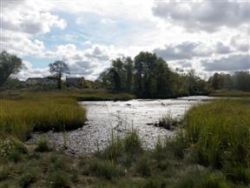Udall's Park Preserve
The Daily Plant : Thursday, February 17, 2011
Protecting And Preserving Our Urban Wetlands

Established in 1984, the Natural Resources Group was the nation’s first urban public division devoted to ecological conservation and restoration. Its mission is to protect, restore, and manage the nearly 11,000 acres of natural habitats within parkland.
On December 1, 2010, NRG organized a wetlands workshop at Columbia University's Lerner Hall to bring together, for the first time, a select group of regional wetland experts to discuss specific issues related to urban wetlands and stream conservation and restoration in New York City. The goal of the workshop was to identify the key components of a comprehensive wetlands protection, management and restoration strategy for the city, including assessment needs, target wetland conditions and functions, and data gaps and coordination needs.
The workshop was motivated, in part, by the multiple planning efforts underway in the city that will affect wetlands and riparian areas. These efforts include the revision of the Comprehensive Restoration Plan for the New York /New Jersey Estuary, the Comprehensive Waterfront Plan for 2020 released this year, and formulation of a comprehensive wetlands protection policy for NYC by 2012, as required by city law. As the largest wetlands land owner in NYC, we were seeking expert input in developing a strategy for the management of our wetland and stream resources so that their beneficial functions can be protected and integrated into future planning efforts.
Over 60 well known practitioners, academics, resource managers, other professionals in the field participated in the workshop, which began with an introduction by Commissioner Benepe and Bram Gunther, Chief of Forestry, Horticulture and Natural Resources. Talks in the morning provided a general background on wetlands protection and restoration objectives, as they fit into PlaNYC and the Harbor Estuary program, as well as some more detailed examples of the wetland threats, assessment techniques, and adaptation and restoration opportunities. In afternoon breakout sessions the participants discussed issues related to setting objectives for wetlands assessment, protecting small and fragmented freshwater wetlands, addressing threats facing coastal wetlands, and setting performance standards for wetlands restoration. Everyone gathered again in the final session to report back on what the groups had discussed. Our partners in the Harbor Estuary Program at the Army Corps of Engineers ended the day by proposing action items that emerged from the days' events.
In all, the workshop allowed us to secure new technical and professional partnerships with experts in other states and agencies, and to re-invigorate our current partnerships. A summary of the recommendations, the presentations, and the participants list from the workshop will be available on the Parks website shortly.
Submitted by Marit Larson and Kathy Lee
QUOTATION FOR THE DAY
“The best doctor in the world is the veterinarian.
He can't ask his patients what is the matter
- he's got to just know.”
Will Rogers
(1879 - 1935)
Check out your park's Vital Signs
Clean & Safe
Green & Resilient
Empowered & Engaged Users
Share your feedback or learn more about how this park is part of a
Vital Park System
